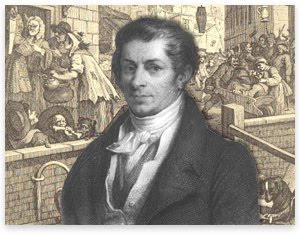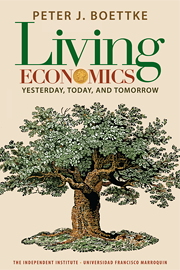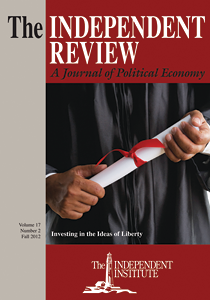Farm production produces three rents, one of which sustains the farm workers, while the other two can be sold at wholesale to entrepreneurs who in turn provide property owners and farmers with goods and merchandise. This is the circular flow model of the economy. Money facilitates the flow and timing of rent payments (i.e., “velocity”) and the rate of the monetary flow determines the ratio between the quantity of money and the value of annual production. This model is then used to explain the implications of international trade.
IT IS THE GENERAL OPINION in England that a farmer must make three rents. The first is the principal and true rent that he pays to the property owner, which is assumed to be equal in value to one-third of the farm’s output. A second rent goes for his maintenance and that of the men and horses he employs to operate the farm, and a third rent that he keeps for making the business profitable.
The same idea generally is the norm in other countries of Europe, though in some states, like Milan, the farmer gives up half the product instead of a third. It is also true that many landlords in all countries try to lease their farms at the highest price they can; but when it is above one-third of the product, the farmers generally are very poor. I do not doubt that the Chinese landowner extracts from his farmer more than three-fourths of the product of the land.
However, when a farmer has some capital to carry on the management of this farm, the owner who leases him the farm for one-third of the product will be sure of payment and will be better off by such a deal than if he leases his land at a higher rate to a poor farmer and faces the risk of losing all his rental income. The larger the farm, the better off the farmer will be. This is seen in England where farmers are generally more prosperous than in other countries where farms are small.
The assumption I shall make in this inquiry of the circulation of money is that farmers earn three rents and they spend the third rent to live more comfortably, instead of saving it. This is indeed the case with most farmers in all countries.
All the products in the state come directly or indirectly from the hands of the farmers, as well as all the materials from which commodities are made. The land produces everything but fish, and even then, the fishermen who catch the fish must be maintained by the products of the land.
The three rents of the farmer must therefore be considered the principal sources or, so to speak, the mainspring of circulation in the state. The first rent must be paid to the property owner in cash. For the second and third rents, cash is needed for the iron, tin, copper, salt, sugar, cloth, and generally all the products from the city that are consumed in the countryside. However, all that hardly exceeds one-sixth of the total of the three rents. As for the food and drink of the country folks, cash is not always necessary to obtain them.
The farmer may brew his beer or make his wine without spending money. He can make his bread, slaughter the oxen, sheep, pigs, etc., that are eaten in the country. He can pay most of his assistants in wheat, meat, and drink, not only laborers, but country artisans as well, by valuing products at the prices of the nearest markets, and labor at local wage rates.
The things necessary to life are food, clothing, and housing. There is no need for cash to obtain food in the country, as I have just explained. If coarse linen and cloths are made there70 and if houses are built there, as is often the case, the labor may be paid in barter by valuation without cash being needed.
The only cash needed in the countryside is for the rent payment to the property owner and for the goods obtained from the city, such as knives, scissors, pins, needles, cloths for some farmers or other well-to-do people, kitchen utensils, plates, and generally all that is obtained from the city for use in the countryside.
I have already noted that it has been estimated that half the inhabitants of a state live in the cities, and that consequently, those who live in the city consume more than half the production of the land. Cash is therefore necessary, not only for the rent payment to the owner, corresponding to one-third of the product of the land, but also for the city merchandise consumed in the country, which may amount to something more than one-sixth of the product of the soil. However, one-third and one-sixth amount to half the product. The cash circulating in the country must therefore be equal to at least one-half the product of the land, while the other half, or somewhat less, may be consumed in the country without need for cash.
The circulation of this money takes place when the property owners spend the rents they collected in lump sums from the farmers on retail purchases in the city. The entrepreneurs of the cities (e.g., butchers, bakers, brewers, etc.) then collect this same money, little by little, in order to buy goods from the farmers, such as cattle, wheat, barley, etc. In this way, all the large sums of money are distributed in small amounts, and all the small amounts are then collected to make payments in large amounts, directly or indirectly, to the farmers. Therefore this money serves both in wholesale and retail.
When I stated that the necessary quantity of money for circulation in the countryside is often equal to half the product of the land, this is the minimum. For the circulation in the countryside to be easily conducted, I will suppose that the cash needed is equal in value to two-thirds of the farmers’ income, or two-thirds of the product of the land. It will be seen later that this assumption is not far from the truth.
Let us now imagine that the money conducting the whole circulation in a small state is equal to 10,000 ounces of silver, and that all the payments made with this money, country to city, and city to country, are made once a year. In addition, these 10,000 ounces of silver are equal in value to two of the farmers’ rents, or two-thirds of the product of the land. The rents collected by the property owners will correspond to 5,000 ounces, and the whole circulation of the remaining silver between the people of the countryside and those of the city, made by annual payments, also will correspond to 5,000 ounces.
However, if the owners stipulate that their farmers make payments every six months instead of once a year, and if the other debtors also make their payments every six months, this will alter the pace of circulation. While 10,000 ounces were needed to make the annual payments, only 5,000 will now be required because 5,000 ounces paid twice over will have the same effect as 10,000 ounces paid once.
Furthermore, if the owners stipulate that their farmers make quarterly payments, or if they are satisfied to receive payments from the farmers as the four seasons enable them to sell their products, and if all other payments are made quarterly, only 2,500 ounces will be needed for the same circulation that would have required 10,000 ounces paid annually. Therefore, supposing that all payments are made quarterly in the small state in question, the proportion of the value of the money needed for the circulation is to the annual product of the soil (or the three rents), as 2,500 livres is to 15,000 livres, or 1 to 6, so that money would correspond to a one-sixth of the annual production.
However, considering that each branch of the circulation [i.e., the economy] in the cities is carried out by entrepreneurs, and that the consumption of food is paid for daily, weekly, or monthly, and that clothing purchased once or twice a year by families is paid for at different times by different people; and considering also that the expenditure on beverages is usually made daily, and that payment for beer, coal, and a thousand other articles of consumption is very prompt, then it would seem that the proportion we have established for quarterly payments would be too high and that the circulation of products estimated at 15,000 ounces of silver in value could be conducted with much less than 2,500 ounces of silver coins.
However, because farmers have to make large payments to the owners at least every quarter and that the taxes collected by the prince or the State upon consumption goods are accumulated by the tax collectors to make large payments to the Receivers-General, there must be enough cash in circulation to make these large payments without difficulty, and without hindering the circulation of currencies for the food and clothing of the people.
It will be understood from this that the proportion of the amount of money needed for circulation in a state is not incomprehensible, and that this amount may be greater or less in a state depending on the mode of living and the speed of payments. It is very difficult to lay down anything definite about this quantity in general, as the proportion may vary in different countries. Therefore, it is only conjectural when I say that generally, “the cash or money necessary to carry on the circulation and exchange in a state is roughly equal in value to one-third of all the owners’ annual rents of the said state.”
Whether money is scarce or plentiful in a state, this proportion will not change much, because where money is abundant, land is leased at higher rates and at lower rates where money is scarce. This rule will always be true, at all times. In states where money is scarcer, there usually is more barter by valuation, than in those where money is plentiful, and circulation is more prompt and less sluggish than in those where money is not so scarce. Thus it is always necessary, when estimating the amount of money in circulation, to take into account the speed of its circulation.
Assuming that the money in circulation is equal to one-third of all the owners’ rents and that these rents equal to one-third of the annual product of the land, it follows that “the money circulating in a state is equal in value to the one-ninth of all the annual product of the land.”
Sir William Petty, in a 1685 manuscript, frequently assumes that the money in circulation is equal to one-tenth of the product of the land without explaining his reasoning. I believe he formed this opinion from experience and from his practical knowledge of both the money circulating in Ireland (a country he had measured as a surveyor) and of production, which he estimated from observation. I am not far removed from his idea, however, I chose to compare the money circulating to the owners’ rents, which are ordinarily paid in cash and easily ascertainable by a uniform land tax, rather than to the products of the land because of their daily price variations in the markets, and the fact that a large part of the product is consumed without ever entering the markets. In the next chapter, I shall give several reasons, supported by examples, to strengthen my conclusion. I think this rule is useful, even if it is not mathematically exact in any country. It is sufficient if it is near the truth and if it prevents governors of states from forming extravagant ideas about the amount of money in circulation. There is no branch of knowledge in which one is more subject to error than statistics when they are based on one’s imagination, and none is more informative when they are based upon detailed facts.
Some cities and states, which have no land to call their own, subsist by exchanging their labor and manufactured goods for the products of other lands. For example, in Hamburg, Dantzig, several other cities of the Empire, and even part of Holland, it seems more difficult to estimate the amount of cash in circulation. However, if we could estimate the amount of foreign land used for their subsistence, the calculation would probably not differ from the one I made for the other states that chiefly subsist on their own products, and which are the subject of this essay.
As to the cash needed to carry on foreign trade, it seems that no more is required than what is in circulation in the state when the balance of foreign trade is equal, that is when the products and merchandise sent abroad are equal in value to those imported.
If France sends cloth to Holland and receives spices of equal value in return, the property owner who consumes these spices pays their value to the grocer, who pays the same amount to the cloth maker, to whom the same amount is due in Holland for the cloth he sent there. This is done using bills of exchange, which I will explain later. These two payments take place in France, unconnected to the rent of the property owner, and no money leaves France because of these transactions. All other classes of society consuming Dutch spices similarly pay the grocer. Those living on the first rent, that is the property owners, pay from this rent, and those who live on the other two rents, in the country or the city, pay the grocer, directly or indirectly, out of the money that conducts the circulation of these rents. The grocer again pays this money to the manufacturer in Holland for his bill of exchange and when the balance is equal, no increase of money is needed for circulation in the state due to foreign trade. But if it is not equal, if more merchandise is sold to Holland than is bought back, or vice versa, money is needed for the surplus that Holland must send to France or France to Holland. This will increase or diminish the amount of money circulating in France.
It may even occur that when the balance with the foreigner is equal to the trade with him, commerce with this foreigner may slow down the circulation of currencies, and consequently, a greater quantity of money is required because of this commerce.
For example, if the French ladies who wear French fabrics wish to wear Dutch velvets paid for by the cloth sent to Holland, they will buy these velvets from the merchants who imported them from Holland, and these merchants will pay the cloth manufacturers. The money thus passes through more hands than if these ladies took their money to the cloth manufacturers and contented themselves with French fabrics. When the same money passes through the hands of several entrepreneurs, the rapidity of circulation is slowed down. But it is difficult to make an exact estimate of this sort of delay, which depends upon various circumstances. Thus, in the present example, if the ladies pay the merchant for the velvet today, and the merchant pays his bill with the manufacturer in Holland tomorrow, and if the manufacturer pays the wool merchant the next day, and this last pays the farmer the day after, it is possible that the farmer will keep the money in hand more than two months to make up the quarter’s rent he owes to his landlord. This money might, in two months, have circulated through the hands of a hundred entrepreneurs without slowing down the circulation needed in the state.
After all, we must consider the rent collected by the property owner as the most necessary and considerable part of the money in circulation. If the owner lives in the city and the farmer sells all his production and buys all the goods needed in the country in the same city, the money may always remain in the city. The farmer will sell products there exceeding half the output of his farm and will pay his landlord the money value of one-third of his product and the rest to merchants or entrepreneurs for goods to be consumed in the country. Even here, however, as the farmer sells his products for lump sums, which are subsequently distributed in retail purchases, and are again collected to serve for lump payments to the farmers, the circulation always has the same effect (subject to its rapidity) as if the farmer took the money received for his products to the country, and sent it back again to the city.
The circulation always consists of the large sums, received by the farmer for his products, being distributed at retail, and being brought together again to make large payments. Whether part of this money leaves the city, or remains there entirely, may be regarded as the circulation between city and country. All the circulation takes place between the inhabitants of the state, and they are all fed and maintained in any event from the product of the land and raw materials of the country.
It is true that the wool, for example, which is brought from the country, is worth four times its former value when made up into cloth in the city. However, this increase of value, which is the price of the workmen’s labor and manufactures in the city, is again exchanged for the country products that serve for the laborer’s maintenance.








